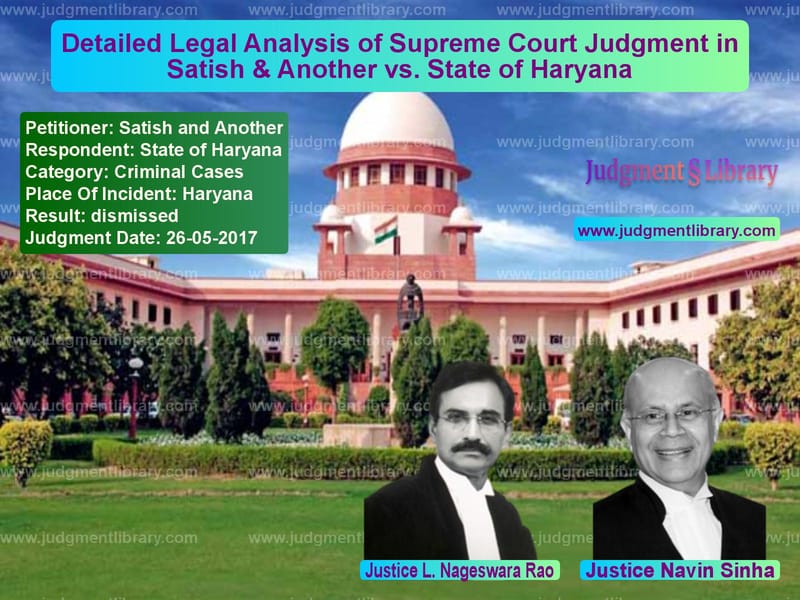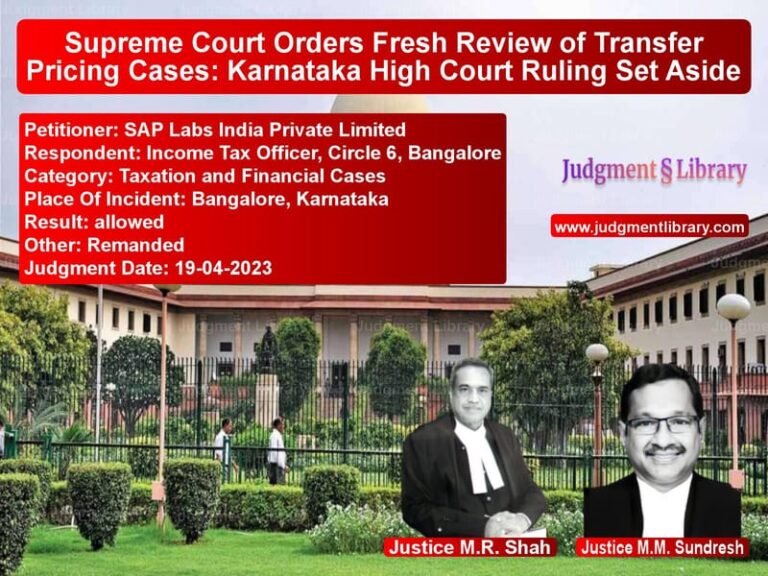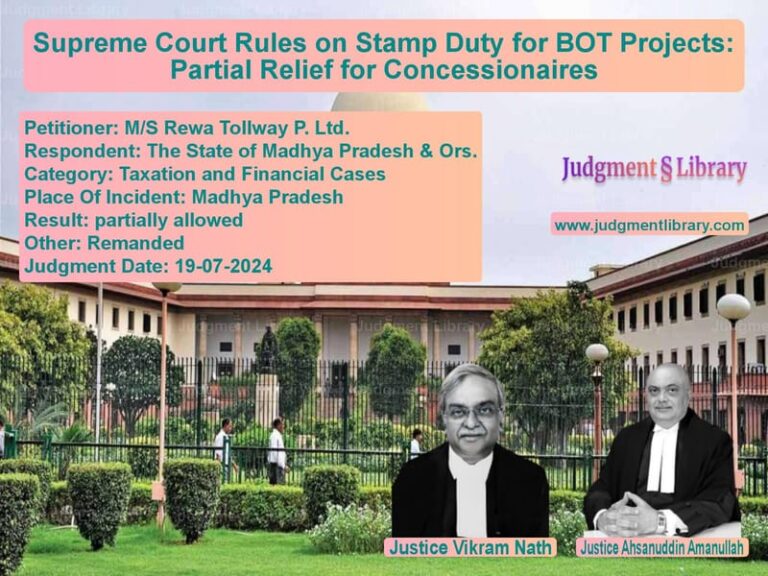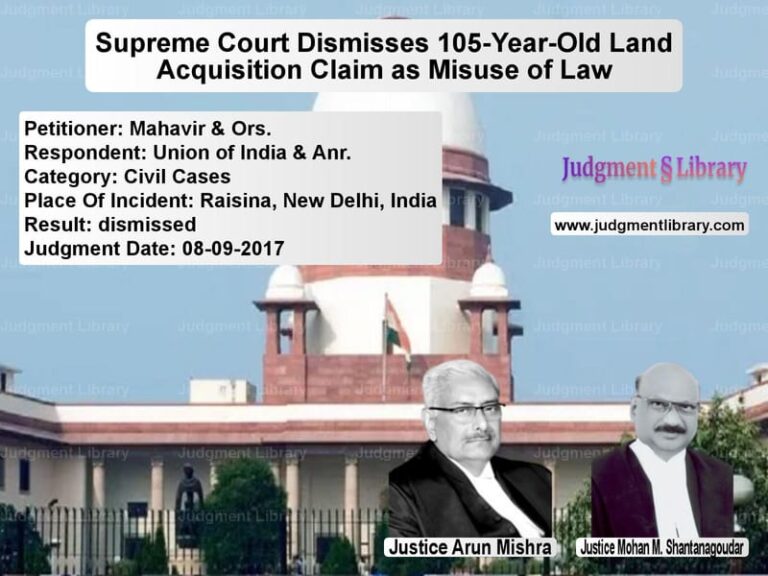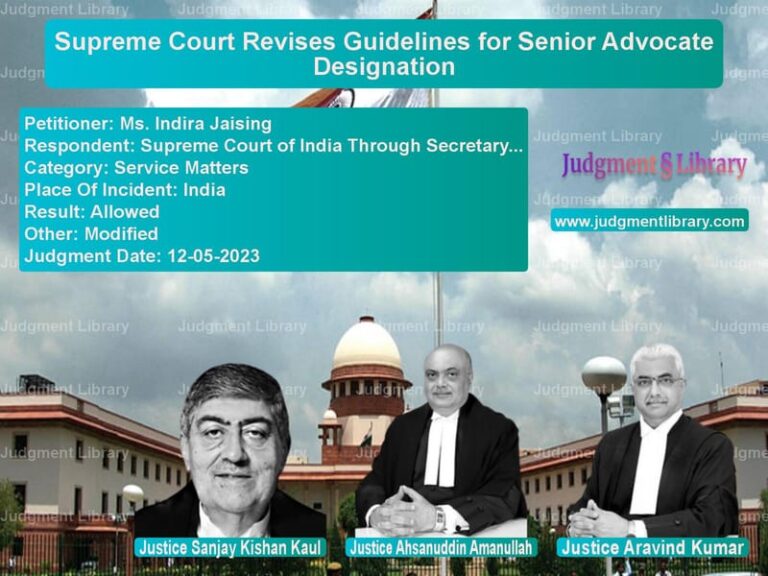Detailed Legal Analysis of Supreme Court Judgment in Satish & Another vs. State of Haryana
The Supreme Court of India, in its judgment delivered on May 26, 2017, in Satish & Another vs. State of Haryana, adjudicated upon a criminal appeal involving charges under Sections 120-B, 302, and 34 of the Indian Penal Code (IPC). The appellants were convicted and sentenced to life imprisonment. The case revolved around a brutal murder inside a home, with the deceased suffering multiple fatal injuries. The ruling, authored by Justice Navin Sinha, carefully examined the evidentiary materials, the reliability of witness testimony, and the role of circumstantial evidence in affirming the convictions.
Case Background
The incident took place on the night of March 31, 2007, and April 1, 2007. The deceased, the husband of one of the appellants, was attacked inside his house at approximately 1:30 a.m. The prosecution’s case was primarily based on the testimony of a child witness, PW-2 Sahil, the son of the deceased, who reported the incident to PW-1 Sunita, a neighbor, early in the morning. The First Information Report (FIR) was lodged at 9:00 a.m., and the post-mortem report recorded multiple incised and penetrating wounds on the body.
Legal Arguments
Arguments by the Appellants
- The appellants’ counsel, Ms. Prachi Bajpai, argued that the delay of eight hours in lodging the FIR created room for manipulation and false implication.
- They contended that PW-2, a child witness, was unreliable as he did not know the accused beforehand and had only identified them in the dock, six months after the incident, without any Test Identification Parade (TIP).
- It was also submitted that the absence of forensic reports for the alleged murder weapons weakened the prosecution’s case.
- Appellant Anita’s counsel, Shri Mahabir Singh, argued that her conviction was primarily based on an extra-judicial confession made to PW-4, which should not have been admitted in evidence.
- They claimed that the confession was unreliable and made under duress, possibly due to property disputes.
Arguments by the Respondent (State of Haryana)
- The prosecution maintained that the delay in filing the FIR was justified given the nature of the crime and that PW-2’s testimony was consistent and reliable.
- The government counsel argued that corroboration of a child witness’s testimony was only a matter of prudence and not a legal necessity.
- They defended the credibility of PW-2, stating that he was old enough to understand the nature of his testimony and that no evidence suggested he was tutored.
- Regarding Anita’s extra-judicial confession, the prosecution submitted that such confessions could be relied upon, provided they were voluntary and truthful.
Supreme Court’s Observations
The Supreme Court closely analyzed the circumstances surrounding the crime and the evidence presented. Some of the critical observations made by the Court included:
- The delay in lodging the FIR was not necessarily indicative of manipulation. Given that the crime occurred at night, the reporting of the matter in the morning was reasonable.
- PW-2’s testimony was credible despite his young age. The Court found his statement to be consistent and detailed, making it trustworthy.
- The absence of an independent forensic report did not significantly impact the prosecution’s case as there was enough substantive evidence to convict the accused.
- The extra-judicial confession made by appellant Anita was not the sole basis for her conviction but was supported by other incriminating evidence.
Judgment and Conviction
The Supreme Court upheld the conviction and dismissed the appeals. The Court found that the appellants were guilty beyond a reasonable doubt, primarily relying on the testimony of PW-2 and corroborative circumstances. It ruled that:
- The murder was premeditated, as evident from the nature and number of injuries inflicted.
- Appellant Anita’s conduct after the crime was unnatural, further implicating her in the conspiracy.
- The failure of the appellants to provide a plausible explanation regarding the murder reinforced the prosecution’s case.
Implications of the Judgment
This ruling reaffirms critical legal principles related to criminal jurisprudence:
- Value of Child Witnesses: The judgment underscores that a child’s testimony can be accepted if it is credible and consistent.
- Delay in FIR Lodgment: The ruling clarifies that a delay in filing the FIR does not automatically render the case unreliable.
- Extra-Judicial Confessions: It reiterates that such confessions, if voluntary and corroborated by other evidence, can be considered in criminal trials.
Conclusion
The Supreme Court’s decision in Satish & Another vs. State of Haryana is a critical reference point for criminal law in India. It reinforces the principle that a conviction can be based on the testimony of a child witness if found credible. Additionally, the case highlights that procedural delays and the absence of certain forensic evidence do not necessarily undermine a case if other evidence strongly supports the prosecution’s claims. By upholding the life imprisonment sentences of the appellants, the Court has reinforced the importance of circumstantial evidence and judicial prudence in criminal cases.
Don’t miss out on the full details! Download the complete judgment in PDF format below and gain valuable insights instantly!
Download Judgment: Satish and Another vs State of Haryana Supreme Court of India Judgment Dated 26-05-2017.pdf
Direct Downlaod Judgment: Direct downlaod this Judgment
See all petitions in Murder Cases
See all petitions in Attempt to Murder Cases
See all petitions in Custodial Deaths and Police Misconduct
See all petitions in Judgment by L. Nageswara Rao
See all petitions in Judgment by Navin Sinha
See all petitions in dismissed
See all petitions in supreme court of India judgments May 2017
See all petitions in 2017 judgments
See all posts in Criminal Cases Category
See all allowed petitions in Criminal Cases Category
See all Dismissed petitions in Criminal Cases Category
See all partially allowed petitions in Criminal Cases Category

